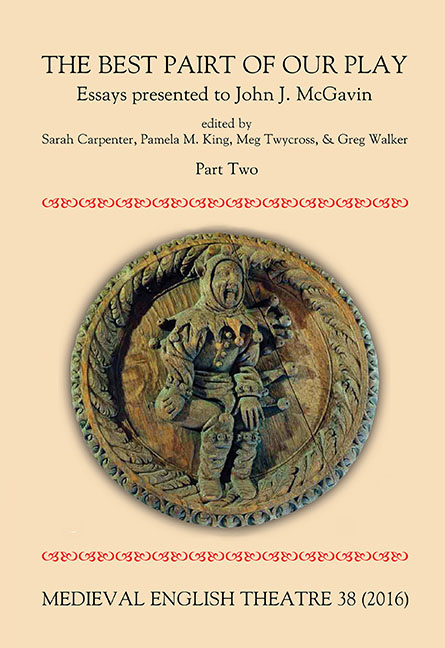 Medieval English Theatre 38
Medieval English Theatre 38 Published online by Cambridge University Press: 20 April 2017
Volume 38 enshrines the second part of the Festschrift presented to John McGavin at the METh meeting at Southampton in 2015. A stimulating and varied collection of papers, it again celebrates the breadth and influence of John's interests — and naturally, with a Scottish bent.
The first two papers, by Alice Hunt and Eila Williamson, show how a coronation (of James I and VI) and a funeral (of ‘bold Buccleuch’) spoke to their audiences through ceremonial and its carefully devised trappings. The scene then shifts to Wales: Sue Niebrzydowski describes a Welsh play of Troelus a Chresyd which drew its plot from both Chaucer and Henryson, while David Klausner attempts to disentangle the events behind the reportage of what was possibly an early monastic Crucifixion play. A group of essays addresses audience and spectatorship. Elisabeth Dutton juxtaposes an Annunciation by Fra Lippo Lippi with a seemingly incongruous partner, the St John's College 1602 student play of Narcissus showcased at the Southampton METh meeting, to consider the nature of spectatorship and self-realisation both inside and outside a work of art. Charlotte Steenbrugge convincingly challenges the too-easy assumption that the modes of audience address in morality plays must be the same as those of sermons. Nadia van Pelt calls on cognitive science to assess how new theories can contribute to our analysis of multiple spectator reactions. Mishtooni Bose explores ‘the drama of performed thought’ in didactic dialogue-plays, in which an apparent impasse can enable a leap of thought which opens up new ground. Pamela M. King offers a reconstruction of the soundscape, intentional and peripheral, of the York Corpus Christi Play. Clare Egan tackles an unexpected form of performance, the publication of libels, using the rich but underexplored resource of reports of Star Chamber cases from Devon. Finally, we are honoured to be able to present David Mills’ last article, intended for the Festschrift and dictated to Joy Mills, on the Abraham Sacrifiant of Theodore Bèze.
To save this book to your Kindle, first ensure no-reply@cambridge.org is added to your Approved Personal Document E-mail List under your Personal Document Settings on the Manage Your Content and Devices page of your Amazon account. Then enter the ‘name’ part of your Kindle email address below. Find out more about saving to your Kindle.
Note you can select to save to either the @free.kindle.com or @kindle.com variations. ‘@free.kindle.com’ emails are free but can only be saved to your device when it is connected to wi-fi. ‘@kindle.com’ emails can be delivered even when you are not connected to wi-fi, but note that service fees apply.
Find out more about the Kindle Personal Document Service.
To save content items to your account, please confirm that you agree to abide by our usage policies. If this is the first time you use this feature, you will be asked to authorise Cambridge Core to connect with your account. Find out more about saving content to Dropbox.
To save content items to your account, please confirm that you agree to abide by our usage policies. If this is the first time you use this feature, you will be asked to authorise Cambridge Core to connect with your account. Find out more about saving content to Google Drive.